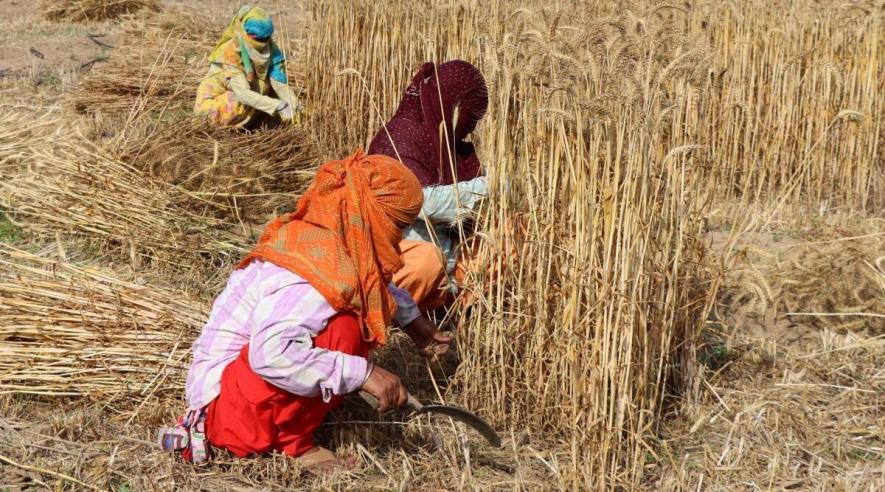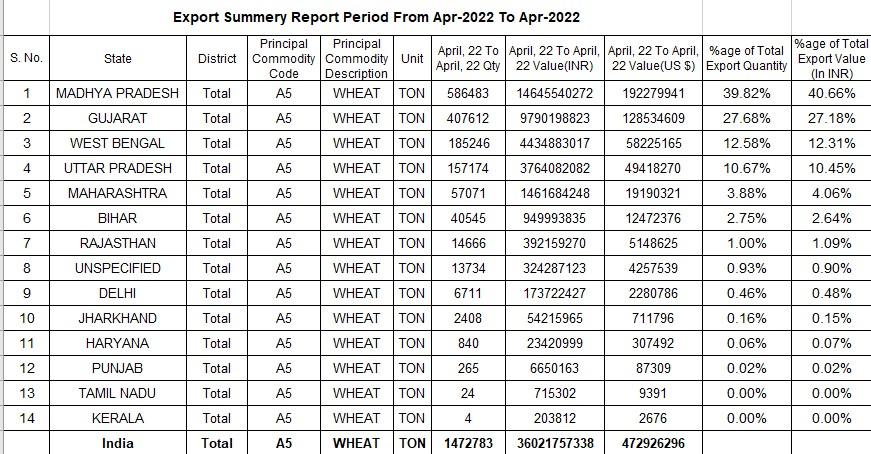Sudden Wheat Export Ban Costs MP Traders Dearly

Image for representational purpose. Credit: The Indian Express
Bhopal: Madhya Pradesh traders, despite having exported a record 38% of the wheat in April this year out of a total 14.72 lakh MT sent to foreign countries, are in peril after a month of the ‘out of the blue’ wheat export ban.
Traders claimed that over one lakh tonne of wheat was sold to the MNCs as per the contract stuck in various godowns across the state after the companies refused to lift the stock upon ban. Another nine lakh tonnes of unsold wheat are lying in godowns and six-seven lakh tonnes of wheat are stuck at various ports.
With the government’s support and profitable deal with the MNCs, the upbeat traders hoarded wheat in large quantities. Against the MSP of 2015 this year, traders purchased the grain at a high price of over Rs 2,400 per 100 kg (one quintal) and sold it to MNCs with a profit of Rs 100-200 per quintal. As a result, in April alone, the state exported a record 5,86,423 MT of wheat to foreign countries, accounting for 38% of the total wheat exported by India in the said month.
Nonetheless, the looming uncertainty over the export policy and traders largely hoarding the already sold stock are leading to the unprecedented surge in the rate of wheat in the state. In some areas, the prices are crashing as some small traders are selling wheat at a loss of Rs 200 to 300 per quintal (100 kg) and creating chaos in the market.
On May 13 last month, India prohibited wheat exports that the world was counting on to alleviate supply constraints sparked by the ongoing Ukraine-Russia war, saying that the food security of the nation was under threat. Imposing a blanket ban on new shipments, India’s Directorate General of Foreign Trade clarified that exports will still be allowed to countries that require wheat for ‘food security needs’ and it will be based on the requests of their governments.
“The government has no clarity on any policy. A week before the ban, PM Narendra Modi, CM Shivraj Singh Chouhan and trading companies were encouraging traders to hoard wheat from the mandis for export,” said Gopal Das Aggrawal, president of Sakal Anaaj Dalhan Tilhan Vyapari Mahasangh Samiti Madhya Pradesh (SADTVMS).
After the ban, traders of Madhya Pradesh felt ‘betrayed’ not only by the state and Union governments but also by the trading companies who cancelled their contracts without talking of compensation a day after the announcement of the ban.
Wheat output and its quality fell in states like Punjab, Haryana, and Rajasthan owing to unprecedented heat, the hottest in 122 years, as wheat shrivels in the heat when it is ready to harvest. However, it did not affect Madhya Pradesh, as per the government, making it the only state with the best quality of wheat, which produced over 350 lakh metric tonnes this year.
To meet the international demand for wheat during the Ukraine-Russia war, India allowed private wheat export for the first time and urged traders to fill the vacuum with Indian wheat. As a result, demands for Madhya Pradesh’s wheat grew in the international market and traders hoarded the grain at a higher price, paying the farmers upfront.
As per the wheat export data from the Directorate General of Commercial Intelligence and Statistics (DGCI&S), in April 2022, India exported 14,72,423 MT wheat to countries like Yemen, Korea, UAE, Thailand, Oman, Qatar, Vietnam, Malaysia and others. Madhya Pradesh emerged as a major exporter from India with 40% of the total export value after Gujarat and West Bengal with 27% and 12%, respectively.

Madhya Pradesh largely exports six kinds of wheat; Malwa Shakti, Mill Quality, Lokvan, Cross, Sharbati, and Duram.
“With the government’s support and flawless transactions with the export companies, traders purchased the wheat in great quantities, but the sudden ban took everyone by surprise. Many small traders have incurred major losses. Many took loans by mortgaging their properties,” said Neemesh Aggrawal, member of the Sakal Anaaj Dalhan Tilhan Vyapari Mahasangh Samiti and former president of Ujjain Vyapari Sangh. He added that many MNCs are refusing to take April’s order forcing the traders to hoard.
Harish Gyanchandani, a trader from Bhopal blamed the Union government for their losses. “Four small traders of Bhopal Mandi are left with over 25,000 bags of wheat, each with 100 kg. Either they wait for the resumption of export and bear the cost of storage and maintenance or sell in the open market with a loss of over Rs 200-300 per bag.”
“Each trader is incurring a loss of over 35,000 on each truck returning from the port,” said Gyanchandani, adding that the Union government has failed to fix the GST law even after five years of its implementation.
Wheat statistics of Madhya Pradesh
|
Year |
Production (Lakh MT) |
Procurement (Lakh MT) |
Total Export (Lakh MT) |
MSP |
|
2019-20 |
372 |
67.25 |
N/A |
1840 |
|
2020-21 |
347 |
129.42 |
0.84 |
1925 |
|
2021-22 |
357 |
128.16 |
2.08 |
1975 |
|
2022-23 |
N/A |
46.03 |
5.86 (Till April) |
2015 |
In a bid to address their issues, the Madhya Pradesh traders association met with a slew of party leaders and ministers in the last week of May, including Union Minister of Commerce Piyush Goyal, Union Agriculture Minister Narendra Singh Tomar, Chief Minister Shivraj Singh Chouhan and even Bharatiya Janata Party state president VD Sharma.
When contacted, Vikas Narwal, Managing Director of the State Mandi Board, said, “It’s true that the sudden ban may have affected the traders, but the Union government took this step to control inflation and downstream the rate of wheat in the Indian market. Not just India, governments around the world are seeking to ensure local food supplies with agriculture prices surging. Indonesia has halted palm oil exports, while Serbia and Kazakhstan imposed quotas on grain shipments.”
The ban cost them money and affected their relations with the multinational companies they have built over the years. Some traders sent legal notices to the companies demanding compensation for abruptly cancelling the deals, while many urged the government for action. MNCs point towards the export ban order and contracts which carry force majeure clauses, while the traders say they sold wheat to the MNCs and not for exports.
“We had confirmed the contract on May 11 and started loading containers of the railway rake, and suddenly when the loading was about to be completed, we got a message asking us not to load as the contract stands cancelled. I have incurred huge losses for loading, unloading and having to sell that stock at lower prices than what I had contracted for,” said a trader requesting anonymity.
“The export ban decision has affected the good relations between traders and exporters established over the years. There is now a strange feeling of animosity,” he added.
Raju Khandelwal, a broker, said that almost all the MNCs have cancelled their purchase contracts with the traders. “Government should have analysed its storage and demand before allowing the wheat export,” he lamented.
Nonetheless, Mandi Board official Vikas Narwal is hopeful for the wheat export trade, pointing out that the government-to-government export is open. “We are planning to reach out to wheat importer countries through their embassies to raise the demand. And we will deliver if they agree," he said.
The unplanned decision for international wheat trade and then rolling it back created a wheat crisis in the country, as it appears, with the government’s decision to replace wheat with rice in the public distribution system (PDS).
Madhya Pradesh, which on average produces 350 Lakh MT wheat every year, will also offer rice instead of wheat to the PDS card holders as it has received more rice stock than wheat this year.
Confirming the move, Tarun Pithode, a senior official of the Food and Civil Supplies Department of Madhya Pradesh, said, “Madhya Pradesh used to receive a stock of 2 lakh tonne of wheat and 50,000 tonne rice. This year, nonetheless, we have received 1.10 lakh tonne wheat and 1.6 lakh tonnes of rice.”
To deal with the situation, the Department has revised the ration distribution of all the districts and segregated it. “Rice will be largely distributed in Eastern Madhya Pradesh and wheat would be in western,” Pithode added.
Get the latest reports & analysis with people's perspective on Protests, movements & deep analytical videos, discussions of the current affairs in your Telegram app. Subscribe to NewsClick's Telegram channel & get Real-Time updates on stories, as they get published on our website.
























